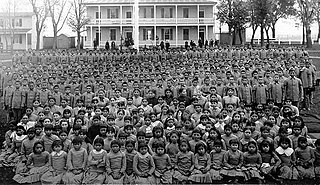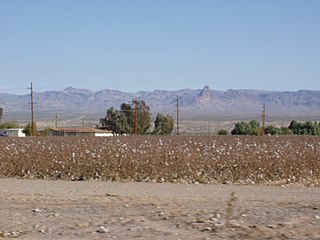Related Research Articles
Worcester v. Georgia, 31 U.S. 515 (1832), was a landmark case in which the United States Supreme Court vacated the conviction of Samuel Worcester and held that the Georgia criminal statute that prohibited non-Native Americans from being present on Native American lands without a license from the state was unconstitutional. The opinion is most famous for its dicta, which laid out the relationship between tribes and the state and federal governments. It is considered to have built the foundations of the doctrine of tribal sovereignty in the United States.

Tribal sovereignty in the United States is the concept of the inherent authority of indigenous tribes to govern themselves within the borders of the United States.
Oliphant v. Suquamish Indian Tribe, 435 U.S. 191 (1978), is a United States Supreme Court case deciding that Indian tribal courts have no criminal jurisdiction over non-Indians. The case was decided on March 6, 1978 with a 6–2 majority. The court opinion was written by William Rehnquist, and a dissenting opinion was written by Thurgood Marshall, who was joined by Chief Justice Warren Burger. Justice William J. Brennan did not participate in the decision.

Indian country is any of the many self-governing Native American/American Indian communities throughout the United States. As a legal category, it includes "all land within the limits of any Indian reservation", "all dependent Indian communities within the borders of the United States", and "all Indian allotments, the Indian titles to which have not been extinguished."
Cherokee Nation v. Georgia, 30 U.S. 1 (1831), was a United States Supreme Court case. The Cherokee Nation sought a federal injunction against laws passed by the U.S. state of Georgia depriving them of rights within its boundaries, but the Supreme Court did not hear the case on its merits. It ruled that it had no original jurisdiction in the matter, as the Cherokees were a dependent nation, with a relationship to the United States like that of a "ward to its guardian," as said by Chief Justice Marshall.

An Indian reservation is an area of land held and governed by a U.S. federal government-recognized Native American tribal nation, whose government is semi-sovereign, subject to regulations passed by the United States Congress and administered by the United States Bureau of Indian Affairs, and not to the U.S. state government in which it is located. Some of the country's 574 federally recognized tribes govern more than one of the 326 Indian reservations in the United States, while some share reservations, and others have no reservation at all. Historical piecemeal land allocations under the Dawes Act facilitated sales to non–Native Americans, resulting in some reservations becoming severely fragmented, with pieces of tribal and privately held land being treated as separate enclaves. This jumble of private and public real estate creates significant administrative, political, and legal difficulties.

The Indian Gaming Regulatory Act is a 1988 United States federal law that establishes the jurisdictional framework that governs Indian gaming. There was no federal gaming structure before this act. The stated purposes of the act include providing a legislative basis for the operation/regulation of Indian gaming, protecting gaming as a means of generating revenue for the tribes, encouraging economic development of these tribes, and protecting the enterprises from negative influences. The law established the National Indian Gaming Commission and gave it a regulatory mandate. The law also delegated new authority to the U.S. Department of the Interior and created new federal offenses, giving the U.S. Department of Justice authority to prosecute them.

The cultural assimilation of Native Americans refers to a series of efforts by the United States to assimilate Native Americans into mainstream European–American culture between the years of 1790 and 1920. George Washington and Henry Knox were first to propose, in the American context, the cultural assimilation of Native Americans. They formulated a policy to encourage the so-called "civilizing process". With increased waves of immigration from Europe, there was growing public support for education to encourage a standard set of cultural values and practices to be held in common by the majority of citizens. Education was viewed as the primary method in the acculturation process for minorities.

Talton v. Mayes, 163 U.S. 376 (1896), was a United States Supreme Court case, in which the court decided that the individual rights protections, which limit federal, and later, state governments, do not apply to tribal government. It reaffirmed earlier decisions, such as the 1831 Cherokee Nation v. Georgia case, that gave Indian tribes the status of "domestic dependent nations," the sovereignty of which is independent of the federal government.
United States v. Winans, 198 U.S. 371 (1905), was a U.S. Supreme Court case that held that the Treaty with the Yakima of 1855, negotiated and signed at the Walla Walla Council of 1855, as well as treaties similar to it, protected the Indians' rights to fishing, hunting and other privileges.

Native American civil rights are the civil rights of Native Americans in the United States. Native Americans are citizens of their respective Native nations as well as the United States, and those nations are characterized under United States law as "domestic dependent nations", a special relationship that creates a tension between rights retained via tribal sovereignty and rights that individual Natives have as U.S. citizens. This status creates tension today, but was far more extreme before Native people were uniformly granted U.S. citizenship in 1924. Assorted laws and policies of the United States government, some tracing to the pre-Revolutionary colonial period, denied basic human rights—particularly in the areas of cultural expression and travel—to indigenous people.
Tribal-state compacts are declared necessary for any Class III gaming on Indian reservations under the Indian Gaming Regulatory Act of 1988 (IGRA). They were designed to allow tribal and state governments to come to a "business" agreement. A compact can be thought of as "negotiated agreement between two political entities that resolves questions of overlapping jurisdictional responsibilities Compacts affect the delicate power balance between states, federal, and tribal governments. It is these forms that have been a major source of controversy surrounding Indian gaming. Thus, it is understandable that the IGRA provides very detailed instructions for how states and tribes can make compacts cooperatively and also details the instructions for how the federal government can regulate such agreements.

The Indian Self-Determination and Education Assistance Act of 1975 authorized the Secretary of the Interior, the Secretary of Health, Education, and Welfare, and some other government agencies to enter into contracts with, and make grants directly to, federally recognized Indian tribes. The tribes would have authority for how they administered the funds, which gave them greater control over their welfare. The ISDEAA is codified at Title 25, United States Code, beginning at section 5301.

Indian country jurisdiction, or the extent which tribal powers apply to legal situations in the United States, has undergone many drastic shifts since the beginning of European settlement in America. Over time, federal statutes and Supreme Court rulings have designated more or less power to tribal governments, depending on federal policy toward Indians. Numerous Supreme Court decisions have created important precedents in Indian country jurisdiction, such as Worcester v. Georgia, Oliphant v. Suquamish Tribe, Montana v. United States, and McGirt v. Oklahoma.
Montana v. United States, 450 U.S. 544 (1981), was a Supreme Court case that addressed two issues: (1) Whether the title of the Big Horn Riverbed rested with the United States, in trust for the Crow Nation or passed to the State of Montana upon becoming a state and (2) Whether Crow Nation retained the power to regulate hunting and fishing on tribal lands owned in fee-simple by a non-tribal member. First, the Court held that Montana held title to the Big Horn Riverbed because the Equal Footing Doctrine required the United States to pass title to the newly incorporated State. Second, the Court held that Crow Nation lacked the power to regulate nonmember hunting and fishing on fee-simple land owned by nonmembers, but within the bounds of its reservation. More broadly, the Court held that Tribes could not exercise regulatory authority over nonmembers on fee-simple land within the reservation unless (1) the nonmember entered a "consensual relationship" with the Tribe or its members or (2) the nonmember's "conduct threatens or has some direct effect on the political integrity, the economic security, or the health or welfare of the tribe."
United States v. Lara, 541 U.S. 193 (2004), was a United States Supreme Court landmark case which held that both the United States and a Native American (Indian) tribe could prosecute an Indian for the same acts that constituted crimes in both jurisdictions. The Court held that the United States and the tribe were separate sovereigns; therefore, separate tribal and federal prosecutions did not violate the Double Jeopardy Clause.
United States v. Nice, 241 U.S. 591 (1916), is a United States Supreme Court decision which declared that Congress still retains plenary power to protect Native American interests when Native Americans are granted citizenship. United States v. Nice overruled the Heff decision which declared that Native Americans granted citizenship by the Dawes Act were also then citizens of the state in which they resided, meaning the sale of alcohol to such Native Americans was not subject to Congress's authority.
Santa Clara Pueblo v. Martinez, 436 U.S. 49 (1978), was a landmark case in the area of federal Indian law involving issues of great importance to the meaning of tribal sovereignty in the contemporary United States. The Supreme Court sustained a law passed by the governing body of the Santa Clara Pueblo that explicitly discriminated on the basis of sex. In so doing, the Court advanced a theory of tribal sovereignty that weighed the interests of tribes sufficient to justify a law that, had it been passed by a state legislature or Congress, would have almost certainly been struck down as a violation of equal protection.
The following outline is provided as an overview of and topical guide to United States federal Indian law and policy:
David E. Wilkins, a citizen of the Lumbee Nation, is a political scientist specializing in federal Indian policy and law. He is the E. Claiborne Robins Distinguished Professor in Leadership Studies at the Jepson School of Leadership Studies in the University of Richmond. He studies Native politics, governance, and legal systems, with a particular focus on Native sovereignty, self-determination, and diplomacy. Wilkins was a student of Vine Deloria Jr., coauthoring two books with Deloria and writing a book about his intellectual impact.
References
- Fletcher, Andrew K. 2007 "Suffocating Sovereignty: Implicit Divestiture and the Violation of First Principles" <http://www.heinonline.org/HOL/Page?handle=hein.journals/dcujl5&div=5&collection=journals&set_as_cursor=0&men_tab=srchresults>
- Sappington, Anna O. 2006 "Is Lara the Answer to Implicit Divestiture?: A Critical Answer to the Congressional Delegation Exception" <http://law.bepress.com/expresso/eps/1777/>
- Duthu, N. Bruce. 2000. Harvard Human Rights Journal "Incorporative Discourse in Federal Indian Law: Negotiating Tribal Sovereignty Through the Lens of Native American Literature" <http://www.law.harvard.edu/students/orgs/hrj/iss13/duthu.shtml>